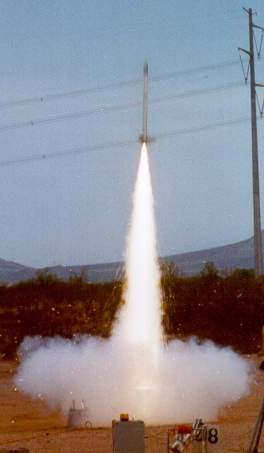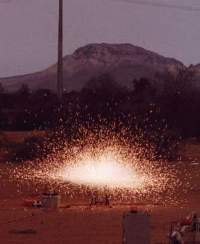Scratch Silver Streak Original Design / Scratch Built
Scratch - Silver Streak {Scratch}
Contributed by Moira Jean Whitlock
| Manufacturer: | Scratch |
 Brief:
Brief:
Simple, high power rocket designed for up to "H" class motors. An
"I" can possibly be used, but there is the risk of not seeing it
again. Nose weight may also have to be added as well for "I" motors.
Basically, it's single stage, 38mm mount, parachute recovery, and features a
54mm Acme fin canister for ruggedness.
Construction:
The main body tube is a single length of kraft paper 54mm motor mount tubing
from LOC, and the nose cone is ogive stock LOC 54mm. The fins are a 3-fin
molded fiberglass fin canister from Acme. The shock cord is 8 feet of 1/2 inch
wide tubular Kevlar®, and it's bolted through a centering ring (1/4 inch Baltic
birch with any size hole, as it's not in the motor mount) aftward and to a
6-inch long eyebolt epoxied and 2-part foamed into the nose cone at the forward
end. The parachute is 36 inches in diameter. It's rip stop nylon and made of a
flat octagonal piece of material. Paneled chutes look nice, but they are harder
to fold and fit into narrow main body tubes. Two centering rings that fit 38mm
motor tubes into a 54mm tube, made of 1/4 inch Baltic birch, center the motor
mount, and the aftward ring holds the motor retainer.
For this rocket, I kept it simple with a double loop of thick, but bendable piano wire that goes through the centering ring to a bolt behind the ring and epoxied in place. This loop bends over the motor, but I don't let it go over the nozzle or else it'll surely burn apart. Sometimes, I put two loops of this kind in the retainer system and further reinforce the hold by clamping a hose clamp over the wires and motor tube just above the thrust ring. To do this, I allow a half inch of the motor tube to overhang the fin can and body, which I make flush with one another.
Simple as pie to make and indestructible. I kept my fin can on by making 2 strips of 1/2 inch wide fiberglass "tape" and placed these above and below the fin can to reinforce the connection of the fin can and body tube, which was done with 30 minute epoxy. Sometimes these fin cans fit loosely over the body tubes, so add 5 minute epoxy fillets between the tube and fin can to fill gaps. To fiberglass on the strips, I use thin, finishing epoxy or West Systems slow epoxy.
The decoration was all in silver. The fin can and nose were spraypainted with krylon chrome car bumper paint, and I used 3 coats to make it shine. The body was decorated in metallic self adhesive mylar from American Science and Surplus. These mylars have silver matrices with diffraction grating patterns that shine many colors in the sun. It looks really sharp.

 Flight:
Flight:
I designed this rocket for Rocketflite Silver Streak motors. It is probably
light enough for the F50, but I had in mind the G160 and H220. Really, any 38mm
"G" and "H" motor would be fine. The Aerotech H73 would be
fine and although I haven't done this an I161 would work, but I wouldn't try
anything hotter. The "G" motors should have a delay of 7 or 8, and I
used delays of 9 for the "H's". A medium, or 10 second delay for
Aerotech loads should be fine.
I didn't design in a payload section, so electronic recovery, while best, wasn't planned.
Prep is simple. Enough worm bed wadding to fill the diameter of the tube and 1/2 inch deep should be enough. Several straight test flights with the use of 29 to 38mm adapters was done with "G" class motors, namely G35 and G40 types with 7 second delays. On a Rocketflite H220-9 SS, the roar was GREAT. The shower of bright white sparks was GREAT. BUT...I haven't ascertained whether the delay after all the years of storage (7) had gone unstable or whether the motor suffered a late cato, but a split second after the pictured takeoff, there was a BOOM and tons of white flame and sparks ensued. The top of the body tube was blasted off. The parachute survived, as did the nose cone and fin canister, so I sawed off the damaged bita and rebuilt the main body.
Summary:
Simple to make and repair.
Other:
Black powder motors of this size seem to have a limited lifespan. If they have
had time to thermocouple or crack, they'll cato spectacularly.
 |
 |